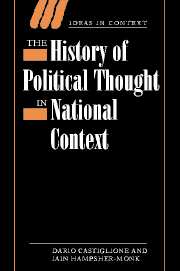Book contents
- Frontmatter
- Contents
- List of contributors
- Preface
- 1 Introduction The history of political thought and the national discourses of politics
- 2 The voice of the ‘Greeks’ in the conversation of mankind
- 3 History of political theory in the Federal Republic of Germany: strange death and slow recovery
- 4 A German version of the ‘linguistic turn’: Reinhart Koselleck and the history of political and social concepts (Begriffsgeschichte)
- 5 One hundred years of the history of political thought in Italy
- 6 Discordant voices: American histories of political thought
- 7 The professoriate of political thought in England since 1914: a tale of three chairs
- 8 The history of political thought and the political history of thought
- 9 The rise of, challenge to and prospects for a Collingwoodian approach to the history of political thought
- 10 Towards a philosophical history of the political
- 11 ‘Le retour des émigrés’? The study of the history of political ideas in contemporary France
- 12 National political cultures and regime changes in Eastern and Central Europe
- 13 The limits of the national paradigm in the study of political thought: the case of Karl Popper and Central European cosmopolitanism
- 14 Postscript. Disciplines, canons and publics: the history of ‘the history of political thought’ in comparative perspective
- Index
- IDEAS IN CONTEXT
10 - Towards a philosophical history of the political
Published online by Cambridge University Press: 23 September 2009
- Frontmatter
- Contents
- List of contributors
- Preface
- 1 Introduction The history of political thought and the national discourses of politics
- 2 The voice of the ‘Greeks’ in the conversation of mankind
- 3 History of political theory in the Federal Republic of Germany: strange death and slow recovery
- 4 A German version of the ‘linguistic turn’: Reinhart Koselleck and the history of political and social concepts (Begriffsgeschichte)
- 5 One hundred years of the history of political thought in Italy
- 6 Discordant voices: American histories of political thought
- 7 The professoriate of political thought in England since 1914: a tale of three chairs
- 8 The history of political thought and the political history of thought
- 9 The rise of, challenge to and prospects for a Collingwoodian approach to the history of political thought
- 10 Towards a philosophical history of the political
- 11 ‘Le retour des émigrés’? The study of the history of political ideas in contemporary France
- 12 National political cultures and regime changes in Eastern and Central Europe
- 13 The limits of the national paradigm in the study of political thought: the case of Karl Popper and Central European cosmopolitanism
- 14 Postscript. Disciplines, canons and publics: the history of ‘the history of political thought’ in comparative perspective
- Index
- IDEAS IN CONTEXT
Summary
For the past twenty years or so we have been witnessing a ‘return to the political’, a phrase now hackneyed by use. Such a return can be explained by the concurrence of two factors. First, it belongs to a moment in history when, simultaneously, we are rediscovering the centrality of the issue of democracy and of its problematic nature. Until the end of the 1960s, the vision of a central ideological divide served to organise intellectual space around the opposition between the two prevailing visions of the world: the Marxist and the liberal. The advocates of classical parliamentary democracy and the champions of ‘real’ democracy each for their part believed that the model whose merits they proclaimed corresponded to a fully realised ideal. In the 1970s, a new version of the critique of totalitarianism challenged such convictions, thus leading to a deeper analysis of the problem of democracy. Since the end of the 1980s, the need for a new social contract, in a context characterised by the rise of nationalism and the crisis of the welfare state, has prolonged this search, thus contributing to making questions of politics central once again. But the ‘return to the political’ has also a methodological dimension. It goes hand in hand with the disenchantment with the social sciences that became apparent in the 1980s. With sociology or anthropology somewhat played out, philosophy seemed to some to offer a better way of both understanding and formulating the problems of contemporary societies. Within such a context one may better appreciate the emergence of what I call the philosophical history of the political.
- Type
- Chapter
- Information
- The History of Political Thought in National Context , pp. 189 - 203Publisher: Cambridge University PressPrint publication year: 2001
- 3
- Cited by



